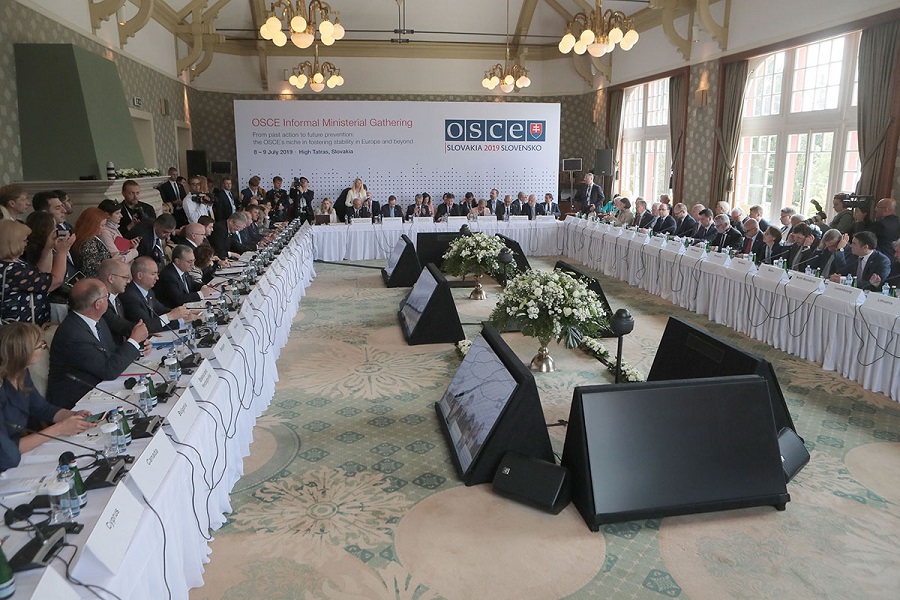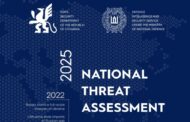Foreign Minister Sergey Lavrov’s speech at the plenary meeting of the OSCE Informal Ministerial Gathering
The High Tatras, July 9, 2019
___________________________________________________________________________________________________________________________________________
First of all, I would like to follow those who spoke before me and thank you for the initiative of holding this gathering in the High Tatras. It is very useful.
Such discussions are particularly important and needed under the current conditions because the military-political situation in the Euro-Atlantic seems worse in a number of aspects than during the Cold War. This did not start yesterday. One must be aware of that. Twenty years ago NATO forces, in violation of the Helsinki Act and the UN Charter, bombed Yugoslavia without UNSC sanction. Five years ago our Western colleagues openly interfered in the internal affairs of Ukraine. They provoked a coup, brought national radicals to power, and thus another conflict emerged in OSCE space – in Donbass. Over the five past years the conflict has not been resolved due to a total undermining of the Minsk agreements by the Petr Poroshenko regime. This is why we hope the new president and the new government, to be formed after the parliamentary election, will put the Poroshenko regime in the past as soon as it can; and of course we will closely monitor the statements on the present situation by the new leadership in Ukraine. So far, we are hearing contradictory statements. On the one hand they seem to say that they will fully comply with the Minsk agreements, on the other hand – they will not have a direct dialogue with Donetsk and Lugansk. This is a contradiction because the essence of the Minsk agreements includes a direct dialogue. We will watch and see.
Among the violations that affect our common security is the establishment by the US of an anti-missile defence system after Washington withdrew from the ABM Treaty. At present, the Intermediate-Range Nuclear Forces (INF) Treaty is also “dying.” Moreover, according to our evaluations, Washington is seriously considering calling off the Comprehensive Nuclear Test Ban Treaty (CTBT). I hope this is just a rumour, but it is a fairly persistent one. Russian President Vladimir Putin and US President Donald Trump discussed the START Treaty in Osaka recently. We are not certain so far how the US will act. It says the treaty is necessary lest we lose all regulating instruments in strategic stability, or it can say the treaty should be extended only if China joins it. These are the issues that all of you might be following.
We are also concerned that the latest version of the US nuclear doctrine has dramatically lowered the nuclear employment threshold. NATO has been militarising North Europe and the Baltic area for five years and moving its military infrastructure closer to Russia’s borders. Let me remind you that the aggregate military budget of NATO countries is 20 times that of Russia, but the myth of the Russian threat continues to be fanned and the European capitals are still being urged to boost their military spending. At the same time, practical cooperation, including that between our militaries, has been fully curtailed. It goes without saying that there is a most dangerous lack of trust between the parties, one that increases the risk of incidents and their unintentional escalation. In this connection, the 2011 Vienna Document is a much discussed topic. Our reply is very simple: Let us go back to the 2011 military presence levels in Europe. If we do so, we will be able to talk about additional confidence-building measures. Because it is wrong to build up the military machine to the extent that has occurred now and then say: Let us show each other “where we are and what we are doing.” In any event, we have experience and we continue expanding on this. I am referring to Russia-NATO briefings and training, observer invitations, and the like. But this is nothing compared to what was before.
We are confident that giving up ideology-laced rhetoric should be the first step. The Swedish Foreign Minister, Margot Wallstrom, began her narrative by mentioning bears and wolves. There is a tale about a little boy the father of whom sent him to watch over their sheep one night. The boy was told that if he saw any wolves, he should scream and his father would come to his rescue. He grew bored and decided to shout “Wolves! Wolves!” to call his father. His father came, realized what was happening and gave him a spanking. However, he did this again the next week… But when the real wolves attacked, the father did not believe the boy, and he was slaughtered along with the sheep. Let us not scare each other with imagined threats, and let us work professionally.
Ten days later, the US seemed to agree at last. There will be a meeting between agencies, diplomats, militaries and security service representatives in charge of strategic stability at the level of deputy foreign ministers. We will see how it works. Almost a year ago, we suggested that Russia and the US do the same as Moscow and Washington did twice during the Cold War. I am referring to the statements they adopted to the effect that a nuclear war cannot be won and therefore must not be allowed to happen. Our US partners have been thinking about this proposal since last October. In the meantime, I repeat, the nuclear doctrine has dramatically lowered the nuclear employment threshold.
I would like to point out that we keep a watchful eye on military developments in the EU within the framework of the common security and defence policy and on the increasing coordination of its activities with NATO, which includes the involvement of neutral states in military exercises, the scenario of which implies the use of Article 5 of the Washington Treaty. This does not look like a positive development at all. I hope this will not increase destabilisation. Anyway, I would like to ask our EU colleagues to remember that it is in their interests to ensure the maximum transparency of these processes, primarily at the OSCE platform.
The OSCE can and must help deescalate military tensions. As my colleagues have said here, this year we will mark the 20th anniversary of the Charter for European Security and the Platform for Cooperative Security based on cooperation. These documents formalised the principle of indivisible security and provided the foundation for cooperation not only among states but also among international organisations. This is what OSCE Chairperson-in-Office and Slovakia’s Minister of Foreign and European Affairs Miroslav Lajcak pointed out at the beginning of our meeting, when he said that such informal meetings are only held rarely. I took part in the meeting which Greek Foreign Minister Dora Bakoyannis chaired on Corfu. It took place long ago. In addition to foreign ministers, it was also attended by secretaries general of NATO, the CSTO and the CIS plus a foreign policy representative of the EU. I believe it was a productive format. I see that some NATO members look down on cooperation with the CSTO. By the way, at the CSTO foreign ministers’ latest meeting we adopted an invitation to the NATO ministers to launch a dialogue. We are waiting for an answer. But I do not think we will receive it, considering the dominant sentiments at NATO. I would like to point out again that there are no drawbacks in our initiative on talking rather than crying wolf all the time. In principle, we are convinced that European security should not be based on containment but rather on constraint. I hope this will be among the key topics on the agenda of the Ministerial Council in Bratislava.
I will not speak about transnational threats, such as terrorism, drug trafficking and cyber security challenges. We are grateful to Slovakia and the OSCE Chairperson-in-Office for organising conferences on these three subjects.
I will not speak in detail about crises. We believe that conflicts should be settled through the involvement of all concerned parties in a direct dialogue, as this should be done in any situation like this. I would like to point out that in the second basket we should nurture the shoots that appeared in the context of our efforts to promote the concept of harmonising integration processes, including between the EU and the EAEU. This dovetails with the decisions on creating the architecture of equal and indivisible security in the Euro-Atlantic and Eurasia, which were adopted at the 2010 OSCE summit held in Astana and which we discussed today.
The key priority in the humanitarian dimension, especially in light of the recent trends, is to cut short the proliferation of aggressive nationalism and neo-Nazism, as well as to protect language, religious and education rights of the national minorities. I cannot fail to mention gross violations of minority rights in Ukraine by the laws adopted by the Poroshenko government. I sincerely hope that the new Ukrainian authorities will set this right.
Speaking about deal-making skills, I have to say that all of us are responsible for implementing our agreements. When we adopted the Declaration on Enhancing Efforts to Combat Anti-Semitism in Basel in 2014, we pledged to adopt similar declarations on combating intolerance and discrimination against Muslims and Christians. As far as I know, some of the leading EU countries, which do not comprise a majority, are categorically against this. I think this is unfair. If we turn a blind eye to religious issues, and if we say that speaking about one’s religious roots is not politically correct, we will not respect the religious beliefs of other people.
Thank you once again. We are open to cooperation, including joint work to prepare the OSCE Ministerial Council in Bratislava. I hope it will be a useful meeting.
* * * * *
Zdroj a ilustračné foto: http://www.mid.ru/ru/press_service/minister_speeches/-/asset_publisher/7OvQR5KJWVmR/content/id/3717795?p_p_id=101_INSTANCE_7OvQR5KJWVmR&_101_INSTANCE_7OvQR5KJWVmR_languageId=en_GB







